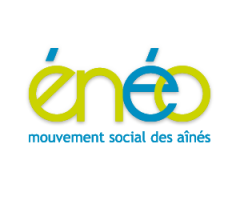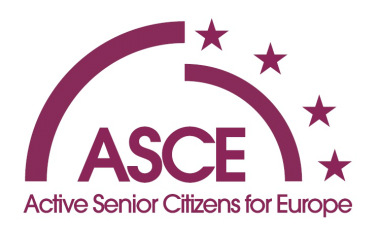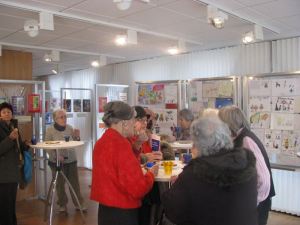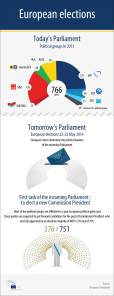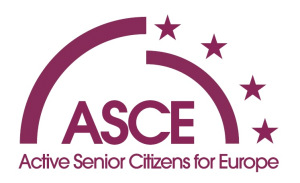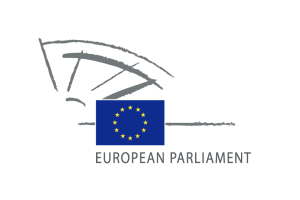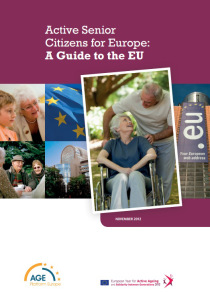
Civil Society Day, 18th March 2014
European elections 2014: Civil society and candidate MEPs commit to a Citizens’ Europe
Joining forces to mobilise EU citizens for the upcoming European elections 2014
European Parliament elections are the periodical momentum to test both politicians’ and citizens’ engagement and capacity to debate on how best shape our societies and improve European integration for the benefit of all. In the light of the democratic crisis and growing mistrust towards the European Union, it is of utmost importance to mobilise EU citizens to go to vote in May, said panellists from AGE, COFACE, ILGA Europe, EWL, ENAR, EDF, EAPN, AEGEE and Eurochild during a joint event on 18 March at the European Parliament hosted by Claude Moraes (MEP, S&D, UK).
“Civil society organisations have a crucial role to play to both voice citizens’ needs in policy developments and to fight against populism and misrepresentations about the EU. However, this can only work if MEP candidates run honest campaigns and take the time to inform the general public about EU competences and what the European Parliament effectively does”, said MEP Claude Moraes in his opening speech.
“We want to make sure that citizens get the right information, vote on actual facts”, said Anne-Sophie Parent, AGE Secretary General. “We also want future MEPs to commit to meet annually with civil society organisations to report back on their activities and listen to grassroots citizens’ needs and expectations”, she continued.
COFACE’s new #FamiliesVOTE2014 publication aims to bring concrete information to the attention of European citizens and boost voters’ knowledge and understanding on what the EP can and will do for families’ wellbeing over the next 5 years. “European citizens and families must make an informed and responsible decision when they cast their vote” said Annemie Drieskens, COFACE President.
“With Y Vote 2014, we are engaging citizens, and especially young students, by raising their awareness about the EU, involving them in drafting recommendatiosn directed to MEPs, and last but not least, empowering them to become multipliers towards other citizens“, said Lucille Rieux from AEGEE, “we need to show them that decision-makers do care for them and do address their needs; This is why we need MEPs to not only give young people’s importance in their speeches, but above all, to act accordingly“.
ILGA-Europe and its member organisations are working hard on their Come Out Campaign to strengthen the human rights agenda of the next EP and Commission, thanks to increased voters’ mobilisation and to concrete commitments by candidates and political parties. “We are also proud to be working with ENAR on our jointcampaign #NoHateEP2014 and promote an EU equality agenda that is common to all communities, including sexual minorities and ethnic minorities”, added Joël Le Déroff from ILGA Europe. ENAR is also promoting 7 key demands for more equality in Europe to future MEPs in the frame of the “I vote for diversity” campaign.
EWL Manifesto “Act now for her future, commit to gender equality” demands a strong Europe promoting women’s and girls’ rights and gender equality. “We encourage our members to send the Manifesto to their MEPs and candidates for the European elections, to use it to launch debates on equality between women and men in Europe”, said Pierrette Pape from EWL.
Champion the rights of children is also the purpose of the Child Rights Manifesto, written by Eurochild and 13 other international and European child rights organisations: “we count on working with MEPs, our members, the voters, as well as children towards that goal.” said Jana Hainsworth, Secretary General of Eurochild.
EDF also urges candidates, political parties and the appropriate authorities in the EU Members States to make sure that the European elections are accessible to persons with disabilities by removing the still existing discriminatory obstacles and restrictions to persons with disabilities’ right to vote and to stand as candidates and by ensuring that all campaign information is accessible. “This is a prerequisite to ensure that most of the 80 million European citizens with disabilities are interested in the elections and go cast their ballot”, stated Etienne Cuche from the European Disability Forum (EDF).
“EAPN welcomes the opportunity of bringing together civil society organisations which are engaged in the European Elections. The meeting today showed the diversity, commitment and strength of the civil society sector whose campaigns will no doubt have an impact on the outcome of the European elections. As EAPN we are calling on candidates to become the champions for a social Europe free of poverty,” concluded Barbara Helfferich, Director of the European Anti-Poverty Network.
Read more about our campaigns:
AGE Platform Europe – Towards an Age-Friendly European Parliament
COFACE - #FamiliesVOTE2014
European Anti-Poverty Network - Electing Champions for a social Europe
European Disability Forum - “Accessible European elections, Inclusive European Societies”
European Network Against Racism (ENAR) - Vote for Diversity
European Women’s Lobby - Act now for her future, commit to gender equality
ILGA Europe - Come Out Campaign
ILGA Europe / ENAR - #NoHateEP2014
AEGEE - Y Vote 2014
Eurochild - Child Rights Champions
Link to this press release in pdf format
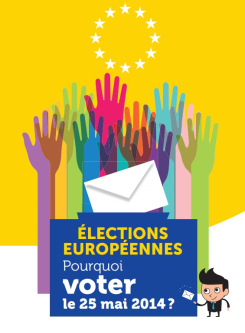 En vue des élections européennes de 2014, la Représentation de la Commission européenne en France, le Parlement européen, les pouvoirs publics français et des associations d’élus territoriaux se sont regroupés avec la société civile, dont l’Alliance pour l’Année européenne des citoyens 2013 (EYCA), pour publier une brochure commune afin de rappeler l’importance d’aller voter le 25 mai.
En vue des élections européennes de 2014, la Représentation de la Commission européenne en France, le Parlement européen, les pouvoirs publics français et des associations d’élus territoriaux se sont regroupés avec la société civile, dont l’Alliance pour l’Année européenne des citoyens 2013 (EYCA), pour publier une brochure commune afin de rappeler l’importance d’aller voter le 25 mai.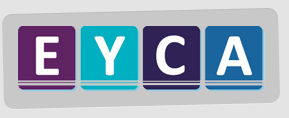 Representatives of the European Year of Citizens Alliance (EYCA) Steering Committee met with the President of the European Parliament, Martin Schulz, on 3rd April 2014 in Brussels to discuss the EYCA recommendations aimed at enhancing European citizenship.
Representatives of the European Year of Citizens Alliance (EYCA) Steering Committee met with the President of the European Parliament, Martin Schulz, on 3rd April 2014 in Brussels to discuss the EYCA recommendations aimed at enhancing European citizenship.
